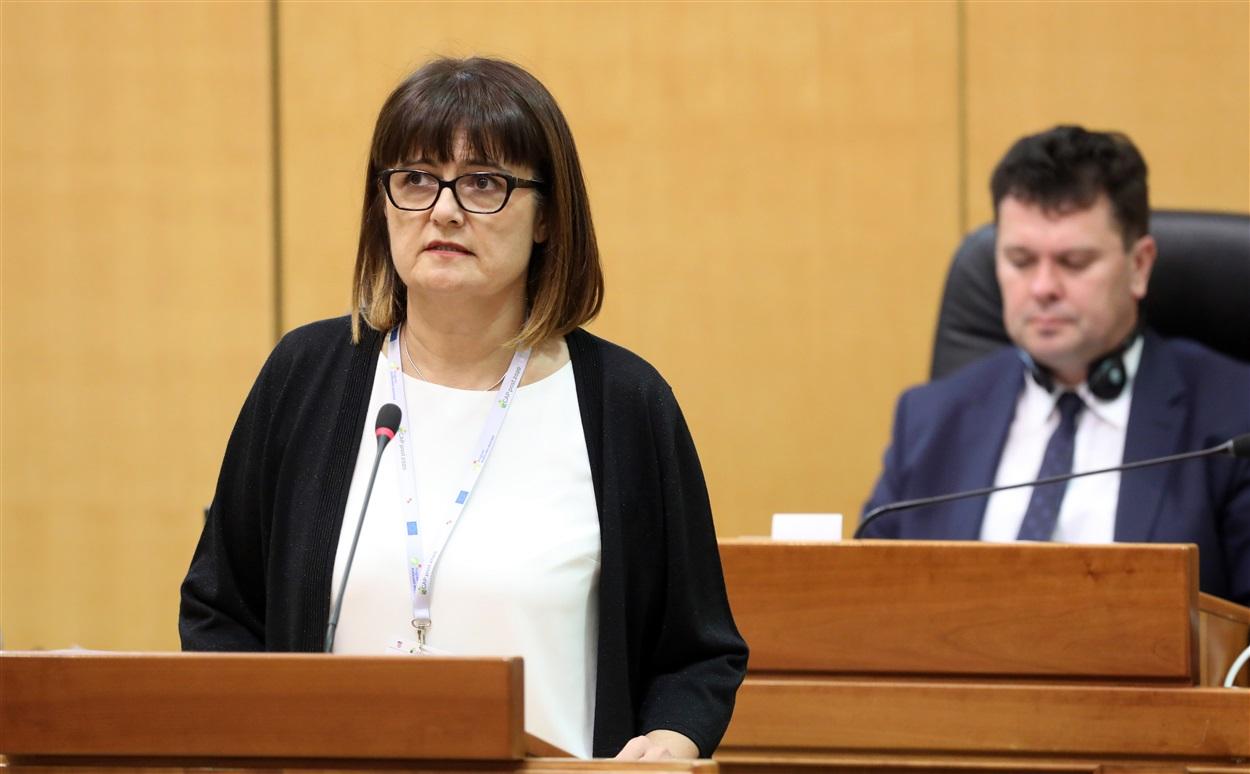
Zagreb – At the end of the first day of the Interparliamentary Conference on “The Role of Parliaments in Shaping the Future of Food and Farming” the participants discussed issues related to agricultural research and food safety and quality.
Chiara Dellapasqua, Policy Officer in the European Commission DG for Agriculture and Rural Development, presented the interactive innovation model which is applied in Operational Groups and helps forming partnerships and networking of farmers, scientists, agricultural businesses, advisory bodies and NGOs. At this moment there are 700 active Operational Groups and for the post 2020 period it is planned that this number will increase to approximately 3200. Under EU’s largest research and innovation programme Horizon 2020 there are more than 100 ongoing projects dealing with current issues such as climate and climate change, water management, food quality, supply chains, marketing and consumption, agricultural production systems, agricultural practices, farming equipment and machinery, plant production, control of diseases and infections. – The implementation of information technologies in agriculture presents a major challenge, but knowledge and innovation are the main objectives pursued by all Member States. We therefore need specific measures for knowledge transfer, consultancy and training in agriculture to which significant resources have been devoted, Dellapasqua said.
For the post 2020 period the European Commission has focused on agriculture that is based on knowledge, innovation and digitization. Every CAP strategic plan will include a chapter that will address modes of fostering knowledge sharing and innovation and developing digital technologies in agriculture. Cooperation, guidance and training programmes are planned for rural development. Under the Horizon programme 10 billion Euro will be made available for food, agriculture, rural development and bioeconomy.
Doina Silistru, Chair of the Committee on Agriculture, Food Industry and Rural Development of the Romanian Senate, said that scientific research was essential to the existence of all nations.
– Those not supporting technological development run the risk of losing their independence. Global warming and food crisis are the main problems for global security – the major challenge of the 21st century, said Silistru adding that scientific research in agriculture is expected to help addressing contemporary challenges, while future EU facilities for research funding should provide concrete financial packages for agriculture, especially for disadvantaged Member States. – Scientific research should be aimed at designing new plant varieties that will be adapted to special conditions in individual Member States, at finding solutions to improve soil quality in order to upgrade agricultural production and competitiveness and in this way contribute to tapping each Member State’s potential, Silistru added. She proposed the establishment of a register of good pilot projects for the purpose of sharing knowledge and experience.
The participants in the debate also discussed the issue of food waste and the need for better cooperation in the bioeconomy sector, which requires training of experts and scientists to develop more innovative systems and technologies. – Digital transformation is a one-way street we all have to follow in order to create the future of agricultural development post 2020, said Charoula Kafantari, Chair of the Greek Parliament's Standing Committee on Production and Trade. She added that the issue of food safety implied adopting environmentally friendly practices, streamlining water resources management, reducing the use of pesticides and protecting family farms.
Director of the Croatian Food Agency Darja Sokolić pointed out that along with numerous advantages, global market also brought great challenges. She noted that incidents in the neighbourhood should not be ignored and added that scientific research was a key factor in solving this kind of problems. – In addition, there is a possibility that the results of such scientific research could be reused, starting with the adoption of adequate regulations or temporary measures at the national level, Sokolić said. She also pointed to some new trends such as the comeback of homemade and traditional food production, the production of new foods entailing new risks to human health, such as various allergens, the consumption of insects and food containing activated charcoal, which all could be objects of scientific research.
Sanja Šeparović from the Croatian Veterinary Chamber spoke of a comprehensive approach to animal protection and safety of food of animal origin. – Every consumer has legitimate expectations regarding the safety of the food placed on the shop shelves, and this implies ensuring traceability of cattle breeding and constant availability of relevant data, starting from the registration of livestock farms, through recording the origin, movement, vaccination and treatment of animals all the way to the slaughterhouse, emphasized Šeparović, adding that such databases should be regularly updated. "If we know our legislative tasks and security programmes, then official controls are important so that the minimum competence standards are known as well. There are veterinary organizations that accumulate tremendous knowledge, and we need to keep them in the process of controlling food safety, Sanja Šeparović concluded at the end of the first day of the Interparliamentary Conference on agriculture and rural development in Zagreb.
All the news about the conference can be found at https://cro-cap.com/.

.png)
